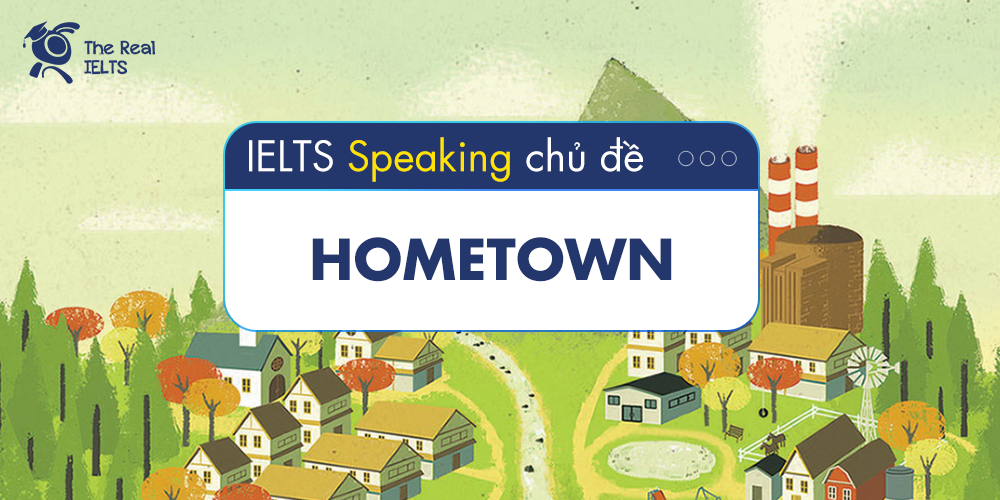Bất kỳ kỹ năng nào khi thi IELTS như kỹ năng IELTS Speaking đều phải luyện tập, luyện tập là một phần không thể thiếu trong ôn thi. Để hỗ trợ các bạn luyện tập IELTS Speaking, TheRealIELTS tạo ra một số bài tập nhẹ nhàng giúp các bạn phần kỹ thuật này:
Luyện tập thêm kỹ năng IELTS Reading:
10 bài tập IELTS Reading dạng Gap Filling
100 câu luyện tập IELTS Reading dạng Gap Filling Matching Names
Đọc thêm: Học IELTS từ 0 lên 6.5 mất bao nhiêu tiền?
100 câu luyện tập IELTS Speaking
Question: Tell me about your hometown.
Answer: My hometown is a small city located in the northern part of [country]. It’s known for its rich history and picturesque landscapes.
Question: What is the population of your hometown?
Answer: The population of my hometown is approximately [number] people.
Question: What are the main industries in your hometown?
Answer: The main industries in my hometown are [industry1], [industry2], and [industry3].
Question: Can you describe the local culture of your hometown?
Answer: The local culture of my hometown is deeply rooted in [tradition/aspect] and is celebrated through various festivals and events.
Question: What are the famous landmarks in your hometown?
Answer: Some of the famous landmarks in my hometown include [landmark1], [landmark2], and [landmark3].
Question: How has your hometown changed over the years?
Answer: Over the years, my hometown has undergone significant changes in terms of infrastructure, technology, and lifestyle.
Question: What recreational activities are popular in your hometown?
Answer: People in my hometown enjoy engaging in activities such as [activity1], [activity2], and [activity3] for recreation.
Question: Is there anything unique or special about your hometown?
Answer: One unique aspect of my hometown is [unique aspect], which sets it apart from other cities.
Question: How do people in your hometown typically spend their weekends?
Answer: On weekends, people in my hometown often [activity1], [activity2], or simply relax with their families.
Question: Are there any traditional foods that are popular in your hometown?
Answer: Yes, some traditional foods in my hometown include [food1], [food2], and [food3], which are loved by locals.
Question: How would you recommend spending a day in your hometown to a tourist?
Answer: To make the most of a day in my hometown, I would recommend visiting [place1], trying the local cuisine, and exploring [place2].
Question: What is the climate like in your hometown?
Answer: The climate in my hometown is [description], with [season1] being [adjective] and [season2] being [adjective].
Question: Are there any traditional festivals celebrated in your hometown?
Answer: Yes, we celebrate [festival1], [festival2], and [festival3] with great enthusiasm and traditional rituals.
Question: What are the transportation options in your hometown?
Answer: In my hometown, people commonly use [mode of transportation1], [mode of transportation2], and [mode of transportation3] to get around.
Question: What efforts have been made to preserve the historical sites in your hometown?
Answer: Various preservation initiatives and conservation projects have been undertaken to maintain the historical sites in my hometown.
Question: How would you describe the local people in your hometown?
Answer: The local people in my hometown are known for their friendliness, hospitality, and strong sense of community.
Question: Are there any famous personalities from your hometown?
Answer: Yes, [name1] and [name2] are notable personalities from my hometown, known for their contributions to [field].
Question: What are the educational opportunities like in your hometown?
Answer: My hometown offers a range of educational opportunities with reputed schools, colleges, and universities catering to diverse interests.
Question: Do you think your hometown is a good place to raise a family?
Answer: Absolutely, my hometown provides a safe and nurturing environment, making it an ideal place to raise a family.
Question: How has technology influenced life in your hometown?
Answer: Technology has significantly influenced life in my hometown, enhancing communication, transportation, and various aspects of daily life.
Question: Are there any environmental issues in your hometown?
Answer: Like many places, my hometown faces challenges such as [issue1] and [issue2], prompting efforts to address and resolve these concerns.
Question: What are the popular local markets in your hometown?
Answer: Some popular local markets in my hometown include [market1], [market2], and [market3], where you can find a variety of goods.
Question: How has tourism impacted your hometown?
Answer: Tourism has positively impacted my hometown by boosting the local economy, promoting cultural exchange, and creating job opportunities.
Question: Are there any traditional crafts or arts in your hometown?
Answer: Yes, [craft1], [craft2], and [craft3] are traditional arts and crafts that have been practiced in my hometown for generations.
Question: Can you share a childhood memory from your hometown?
Answer: One cherished childhood memory from my hometown is [memory description], which brings back nostalgic feelings.
Question: How do people celebrate special occasions in your hometown?
Answer: Special occasions in my hometown are celebrated with gatherings, feasts, and cultural events, creating a festive atmosphere.
Question: What kind of wildlife is native to your hometown?
Answer: The native wildlife in my hometown includes [animal1], [animal2], and [animal3], which can be observed in [natural reserve/park].
Question: Is there a local dialect or language spoken in your hometown?
Answer: While the official language is [language], there is also a local dialect spoken by some residents, adding to the cultural diversity.
Question: How would you compare your hometown to other cities in your country?
Answer: In comparison to other cities, my hometown is [adjective], offering a unique blend of [characteristic1], [characteristic2], and [characteristic3].
Question: What is the significance of the local river/lake in your hometown?
Answer: The local [river/lake] holds great significance in my hometown, serving as a source of water, recreation, and cultural importance.
Question: Are there any famous historical events associated with your hometown?
Answer: Yes, [historical event1] and [historical event2] are significant events that have shaped the history of my hometown.
Question: How would you describe the architecture in your hometown?
Answer: The architecture in my hometown reflects a blend of [architectural style1] and [architectural style2], creating a distinctive urban landscape.
Question: What kind of music or dance is traditional in your hometown?
Answer: Traditional music and dance in my hometown include [music genre1], [music genre2], and [dance style], which are often performed during cultural events.
Question: Is your hometown known for any particular cuisine?
Answer: Yes, my hometown is known for its delicious [cuisine], characterized by [flavor1], [flavor2], and [flavor3].
Question: How has globalization impacted the economy of your hometown?
Answer: Globalization has brought both opportunities and challenges to the economy of my hometown, influencing trade, business, and employment.
Question: What role does religion play in your hometown?
Answer: Religion plays a significant role in my hometown, with various religious institutions and practices contributing to the cultural fabric of the community.
Question: Are there any famous local dishes that visitors should try?
Answer: Absolutely, visitors should definitely try [dish1], [dish2], and [dish3], which are renowned local delicacies.
Question: How has the education system in your hometown evolved over the years?
Answer: The education system in my hometown has evolved to embrace modern teaching methods, technology, and a more diverse curriculum.
Question: Are there any social issues in your hometown that need attention?
Answer: Like any community, my hometown faces social issues such as [issue1] and [issue2], prompting ongoing efforts to address and resolve them.
Question: What are the main sources of income for people in your hometown?
Answer: The main sources of income for people in my hometown include [source1], [source2], and [source3], contributing to a diverse economy.
Question: How has the transportation infrastructure developed in your hometown?
Answer: Over the years, the transportation infrastructure in my hometown has developed to include [transportation mode1], [transportation mode2], and [transportation mode3].
Question: What role do traditional crafts play in the economy of your hometown?
Answer: Traditional crafts in my hometown play a significant role in the local economy, providing employment and contributing to the cultural heritage.
Question: How do people in your hometown embrace technology in their daily lives?
Answer: People in my hometown embrace technology in various aspects of their daily lives, including communication, education, and business.
Question: Are there any historical museums or exhibitions in your hometown?
Answer: Yes, there are several historical museums and exhibitions in my hometown that showcase the rich cultural and historical heritage.
Question: How do people in your hometown celebrate New Year’s Eve?
Answer: New Year’s Eve in my hometown is typically celebrated with fireworks, parties, and festive gatherings among friends and family.
Question: What are the popular sports in your hometown?
Answer: Popular sports in my hometown include [sport1], [sport2], and [sport3], with local teams and events attracting a passionate fan base.
Question: How has the local government contributed to the development of your hometown?
Answer: The local government has played a crucial role in the development of my hometown through initiatives in infrastructure, education, and community welfare.
Question: Are there any traditional rituals or ceremonies in your hometown?
Answer: Yes, [ritual1], [ritual2], and [ritual3] are traditional rituals and ceremonies that hold cultural significance in my hometown.
Question: How would you describe the nightlife in your hometown?
Answer: The nightlife in my hometown is vibrant, with a variety of entertainment options including bars, clubs, and cultural events.
Question: What efforts are being made to promote sustainable development in your hometown?
Answer: Sustainable development initiatives in my hometown focus on [aspect1], [aspect2], and [aspect3] to ensure a balance between growth and environmental conservation.
Question: How has the economy of your hometown diversified in recent years?
Answer: The economy of my hometown has diversified with the growth of sectors such as [industry1], [industry2], and [industry3] in recent years.
Question: Are there any historical legends or stories associated with your hometown?
Answer: Yes, there are several historical legends and stories that have been passed down through generations in my hometown, adding to its cultural heritage.
Question: What natural attractions are there in your hometown?
Answer: Natural attractions in my hometown include [natural attraction1], [natural attraction2], and [natural attraction3], which draw both locals and tourists.
Question: How has the education system in your hometown adapted to technological advancements?
Answer: The education system in my hometown has adapted to technological advancements by integrating online learning platforms, smart classrooms, and e-learning resources.
Question: What traditional games are played by children in your hometown?
Answer: Traditional games like [game1], [game2], and [game3] are still enjoyed by children in my hometown, reflecting the cultural heritage.
Question: How has the healthcare system in your hometown improved over the years?
Answer: The healthcare system in my hometown has improved with the establishment of modern hospitals, healthcare facilities, and the adoption of advanced medical technologies.
Question: Are there any famous historical figures buried in cemeteries in your hometown?
Answer: Yes, the local cemetery in my hometown is the resting place for several famous historical figures, contributing to its historical significance.
Question: What cultural events are organized in your hometown throughout the year?
Answer: Cultural events such as [event1], [event2], and [event3] are organized throughout the year, showcasing the diversity of arts and traditions.
Question: How do people in your hometown celebrate weddings and other significant life events?
Answer: Weddings and significant life events in my hometown are celebrated with elaborate ceremonies, feasts, and traditional rituals that vary based on cultural practices.
Question: What measures have been taken to address environmental sustainability in your hometown?
Answer: Measures such as [measure1], [measure2], and [measure3] have been implemented to address environmental sustainability in my hometown.
Question: How has the architecture of homes in your hometown evolved over the years?
Answer: The architecture of homes in my hometown has evolved with a mix of modern and traditional styles, reflecting changing trends and preferences.
Question: Are there any famous art galleries or studios in your hometown?
Answer: Yes, there are renowned art galleries and studios in my hometown, showcasing the works of local and international artists.
Question: What role do traditional markets play in the economy of your hometown?
Answer: Traditional markets are integral to the economy of my hometown, providing a platform for local businesses and preserving cultural trade practices.
Question: How do people in your hometown celebrate religious holidays?
Answer: Religious holidays in my hometown are celebrated with religious ceremonies, community prayers, and festive gatherings.
Question: Are there any famous local authors or poets from your hometown?
Answer: Yes, [author1] and [author2] are famous local authors from my hometown, known for their literary contributions.
Question: How has the entertainment industry in your hometown evolved?
Answer: The entertainment industry in my hometown has evolved with the emergence of local theaters, cinemas, and cultural events catering to diverse tastes.
Question: What role do community festivals play in the social life of your hometown?
Answer: Community festivals play a vital role in fostering social connections, promoting unity, and celebrating the cultural diversity of my hometown.
Question: How have traditional crafts in your hometown adapted to modern tastes?
Answer: Traditional crafts in my hometown have adapted to modern tastes by incorporating contemporary designs, materials, and marketing strategies.
Question: Are there any initiatives to promote tourism in your hometown?
Answer: Yes, tourism promotion initiatives include [initiative1], [initiative2], and [initiative3] to attract visitors and boost the local economy.
Question: How do people in your hometown celebrate national holidays?
Answer: National holidays in my hometown are celebrated with patriotic events, parades, and cultural activities that bring the community together.
Question: Are there any annual sports events or tournaments in your hometown?
Answer: Yes, annual sports events like [event1], [event2], and [event3] attract participants and spectators from my hometown and beyond.
Question: What impact has urbanization had on the rural areas surrounding your hometown?
Answer: Urbanization has led to changes in the rural areas surrounding my hometown, influencing infrastructure, agriculture, and the overall way of life.
Question: Are there any traditional healing practices or alternative medicine in your hometown?
Answer: Yes, traditional healing practices and alternative medicine are still embraced by some residents in my hometown, alongside modern medical practices.
Question: How do people in your hometown contribute to charitable causes?
Answer: People in my hometown contribute to charitable causes through donations, volunteer work, and participation in community-driven initiatives.
Question: What role does the local media play in shaping public opinion in your hometown?
Answer: Local media in my hometown plays a crucial role in shaping public opinion by covering news, events, and cultural developments.
Question: How has the local cuisine in your hometown influenced the culinary scene in neighboring regions?
Answer: The local cuisine in my hometown has influenced neighboring regions by introducing unique flavors, cooking techniques, and traditional dishes.
Question: Are there any traditional dances performed during weddings or other celebrations in your hometown?
Answer: Yes, traditional dances such as [dance1] and [dance2] are often performed during weddings and other festive celebrations in my hometown.
Question: How has the relationship between different generations evolved in your hometown?
Answer: The relationship between different generations in my hometown has evolved with changing societal norms, but the sense of familial bonds remains strong.
Question: Are there any water bodies or beaches that are popular for recreation in your hometown?
Answer: Yes, [water body1], [water body2], and [beach] are popular recreational spots in my hometown, attracting both locals and tourists.
Question: How has the perception of your hometown changed among outsiders over the years?
Answer: The perception of my hometown among outsiders has changed positively over the years, with increased awareness of its cultural richness and development.
Question: What role do local NGOs play in addressing social issues in your hometown?
Answer: Local NGOs play a crucial role in addressing social issues in my hometown by initiating projects, raising awareness, and advocating for positive change.
Question: How do people in your hometown commemorate historical events?
Answer: Historical events are commemorated in my hometown through events, exhibitions, and educational programs that highlight the significance of those events.
Question: Are there any local legends or myths about the origins of your hometown?
Answer: Yes, there are local legends and myths that offer different perspectives on the origins of my hometown, adding a sense of mystery and intrigue.
Question: How do people in your hometown stay connected with their cultural roots?
Answer: People in my hometown stay connected with their cultural roots through participation in cultural events, traditions, and the passing down of ancestral knowledge.
Question: What initiatives have been taken to promote art and creativity in your hometown?
Answer: Initiatives such as [initiative1], [initiative2], and [initiative3] have been taken to promote art and creativity, providing platforms for local artists.
Question: Are there any local superstitions or beliefs that are still prevalent in your hometown?
Answer: Yes, some local superstitions and beliefs are still prevalent in my hometown, influencing certain practices and behaviors.
Question: How has the perception of your hometown differed from your own childhood to now?
Answer: The perception of my hometown has evolved from my childhood to now, with a greater appreciation for its cultural nuances and historical significance.
Question: What initiatives are in place to promote eco-friendly practices in your hometown?
Answer: Eco-friendly initiatives such as [initiative1], [initiative2], and [initiative3] promote sustainable practices in my hometown.
Question: How has the education system in your hometown addressed inclusivity and diversity?
Answer: The education system in my hometown has taken steps to address inclusivity and diversity by incorporating diverse perspectives in curricula and promoting equal opportunities.
Question: What role do local markets play in preserving traditional crafts and trades in your hometown?
Answer: Local markets play a vital role in preserving traditional crafts and trades by providing a platform for artisans to showcase and sell their products.
Question: Are there any traditional musical instruments associated with your hometown?
Answer: Yes, traditional musical instruments such as [instrument1], [instrument2], and [instrument3] are associated with the cultural heritage of my hometown.
Question: How has the housing infrastructure in your hometown accommodated the growing population?
Answer: The housing infrastructure in my hometown has expanded and adapted to accommodate the growing population through new housing developments and urban planning.
Question: What efforts have been made to protect and preserve historical buildings in your hometown?
Answer: Efforts to protect and preserve historical buildings in my hometown include [effort1], [effort2], and [effort3] to maintain their architectural and cultural significance.
Question: Are there any traditional ceremonies associated with significant life events in your hometown?
Answer: Yes, traditional ceremonies such as [ceremony1] and [ceremony2] are associated with significant life events like weddings and births in my hometown.
Question: How has the local government supported cultural initiatives in your hometown?
Answer: The local government has supported cultural initiatives through funding, infrastructure development, and the organization of cultural events that showcase the town’s heritage.
Question: What role does folklore play in the identity of your hometown?
Answer: Folklore plays a significant role in shaping the identity of my hometown by preserving stories, traditions, and cultural beliefs passed down through generations.
Question: Are there any traditional crafts that are in danger of disappearing in your hometown?
Answer: Yes, some traditional crafts in my hometown are in danger of disappearing due to changing lifestyles, economic factors, and modernization.
Question: How do people in your hometown engage with social media and online platforms?
Answer: People in my hometown engage with social media and online platforms for communication, sharing local news, and promoting cultural events.
Question: How has the local cuisine been influenced by international culinary trends in your hometown?
Answer: The local cuisine in my hometown has been influenced by international culinary trends, introducing new flavors, ingredients, and cooking techniques.
Question: How do people in your hometown commemorate historical anniversaries?
Answer: Historical anniversaries in my hometown are commemorated through events, exhibitions, and educational programs that reflect on the significance of the milestones.
IELTS Speaking là một phần quan trọng trong bài thi IELTS, nơi thí sinh có cơ hội thể hiện khả năng giao tiếp tiếng Anh của mình. Phần thi này được chia thành ba phần chính: phần 1 – Giới thiệu bản thân và các câu hỏi liên quan, phần 2 – Nói về một chủ đề cụ thể, và phần 3 – Thảo luận sâu hơn về các vấn đề liên quan. Dưới đây là một số chi tiết về mỗi phần của IELTS Speaking.
Phần 1: Giới thiệu bản thân và câu hỏi liên quan
Phần đầu của IELTS Speaking thường bắt đầu với một vài câu hỏi giới thiệu cơ bản như tên, địa chỉ, nghề nghiệp, học vấn, sở thích, v.v. Đây là phần nhằm tạo sự thoải mái cho thí sinh và giúp họ làm quen với người chấm điểm.
Các câu hỏi có thể xoay quanh các chủ đề như công việc, học tập, gia đình, môi trường sống, và thậm chí là các sở thích cá nhân. Thí sinh cần trả lời một cách tự tin và mạch lạc, tránh việc sử dụng từ ngữ quá cơ bản và thực hiện giao tiếp tự nhiên.
Phần 2: Nói về một chủ đề cụ thể
Phần này đòi hỏi thí sinh nói về một chủ đề cụ thể trong vòng 1-2 phút sau khi nhận một tờ ghi chú. Chủ đề có thể bao gồm một trải nghiệm cá nhân, một địa điểm, một sự kiện quan trọng, hoặc một vấn đề xã hội.
Thí sinh cần mô tả và phát triển ý một cách rõ ràng và có cấu trúc, sử dụng một loạt từ vựng phong phú và ngữ pháp phức tạp để thể hiện khả năng sử dụng ngôn ngữ của họ. Đồng thời, họ cũng cần giữ mắt liên tục với người chấm điểm để tạo sự giao tiếp hiệu quả.
Phần 3: Thảo luận sâu hơn về các vấn đề
Phần cuối cùng của IELTS Speaking là một loạt các câu hỏi thảo luận sâu hơn về một số vấn đề xã hội, nghệ thuật, giáo dục, công nghệ, và nhiều chủ đề khác. Thí sinh cần tham gia vào cuộc thảo luận một cách tự tin và chứng minh khả năng xử lý những tình huống ngôn ngữ phức tạp.
Các câu hỏi ở phần này thường đòi hỏi thí sinh phải phản ánh, so sánh và đưa ra quan điểm cá nhân một cách logic và thuyết phục. Việc sử dụng từ vựng chính xác và ngữ pháp phức tạp sẽ giúp thí sinh nâng cao điểm số.
Một số tips hữu ích
- Luyện nghe và nói hàng ngày: Hãy lắng nghe các bản tin, podcasts, và tham gia vào các cuộc thảo luận để cải thiện khả năng nghe và nói của bạn.
- Xây dựng từ vựng và ngữ pháp: Sử dụng từ vựng và ngữ pháp phong phú để mô tả ý của bạn một cách chính xác và rõ ràng.
- Thực hành trước một gương mặt hoặc ghi âm: Điều này giúp bạn làm quen với việc nói trước một đối tác và cải thiện cách bạn phát âm và giao tiếp.
Trên tất cả, sự tự tin và quen thuộc với ngôn ngữ sẽ giúp bạn thành công trong phần IELTS Speaking. Hãy thực hành và chuẩn bị kỹ lưỡng để đạt được điểm số tốt nhất.















